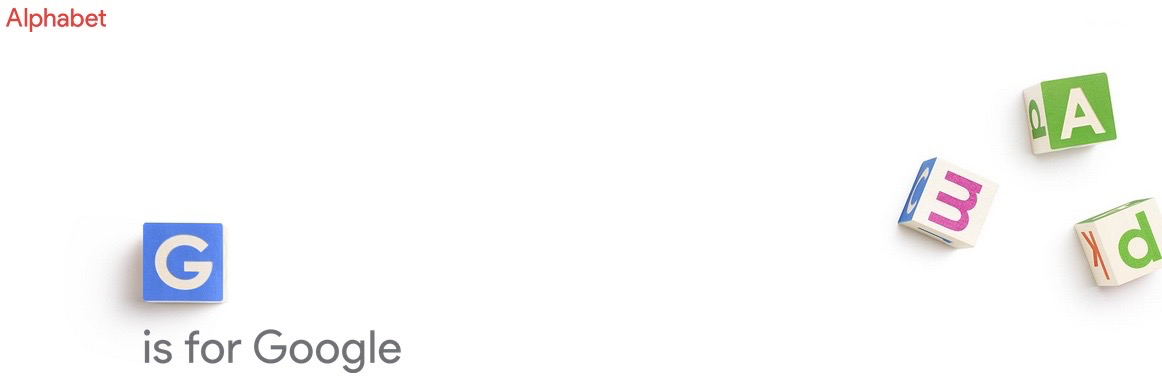
Image via abc.xyz.
by Brent Lightfoot
August 17, 2015
The ABCs just sound better in Delaware. At least, they do to Google co-founders Larry Page and Sergey Brin.
The Alphabet Merger
The Google team announced at the end of the day on Monday, August 10, that a new umbrella corporation called Alphabet Inc. would be created this year to encompass Google and its various subsidiaries.
Google’s current executive team will transfer to head Alphabet Inc. Page will serve as CEO, and Brin will serve as Alphabet’s President. In addition, Eric Schmidt will reprise his role as Executive Chairman, Ruth Porat will be CFO, and David Drummond will be chief counsel.
In the meantime, current head of operations at Google, Sundar Pichai, will step into the role of CEP following the Alphabet Merger.
Under the headline “G is for Google” on the new Alphabet URL https://abc.xyz, Page underscored the alphabet thematic to explain the new company. “What is Alphabet?” he rhetorically queried. “Alphabet is mostly a collection of companies. The largest of which, of course, is Google.”
Basically, the creation of Alphabet is a major overhaul of Google’s corporate structure. Alphabet is a holding company.
According to Page, “the whole point is that Alphabet companies should have independence and develop their own brands.”
What he means is, businesses under the Alphabet umbrella will live or die on their own merits.
“Sergey and I are seriously in the business of starting new things.”
Google stock and Alphabet stock will still trade under GOOG and GOOGL, the stocks set up after Google’s original stock split. The idea is that Google will be able to focus on its own business as a search engine, and the other Google subsidiaries and “investments” will have room to develop independently.
The main Google business will cover searches, ads, Gmail, Google Maps, apps, YouTube, Android and other aspects of the technical online infrastructure.
Calico, Nest, Fiber, Google Ventures, Google Capital, and Google X will be their own companies and managed separately from one another and Google.
According to the 8-k SEC filing published this week, the transition has already been planned out:
Later this year, Google intends to implement a holding company reorganization (the “Alphabet Merger”), which will result in Alphabet owning all of the capital stock of Google. Alphabet will initially be a direct, wholly owned subsidiary of Google. Pursuant to the Alphabet Merger, a newly formed entity (“Merger Sub”), a direct, wholly owned subsidiary of Alphabet and an indirect, wholly owned subsidiary of Google, will merge with and into Google, with Google surviving as a direct, wholly owned subsidiary of Alphabet. Each share of each class of Google stock issued and outstanding immediately prior to the Alphabet Merger will automatically convert into an equivalent corresponding share of Alphabet stock, having the same designations, rights, powers and preferences and the qualifications, limitations and restrictions as the corresponding share of Google stock being converted.
The market reacted favorably to the announcement of the Alphabet Merger. Google’s stock skyrocketed 6% after-hours, following the announcement on Monday, August 10.
Apparently, investors liked Page’s language. In his press release announcing the Alphabet Merger, Page announced the Alphabet priorities as: “Getting more ambitious things done. Taking the long-term view. Empowering great entrepreneurs and companies to flourish. Investing at the scale of the opportunities and resources we see. Improving the transparency and oversight of what we’re doing. Making Google even better through greater focus. And hopefully… as a result of all this, improving the lives of as many people as we can.”
Sundar Pichai has been running Google since October. Now, as new CEO, he will be officially in charge. Page praised him, saying, “It is clear to us and our board that it is time for Sundar to be CEO of Google. I feel very fortunate to have someone as talented as he is to run the slightly slimmed down Google and this frees up time for me to continue to scale our aspirations.”
The transition makes sense, given the growing audacity of Google’s business ventures over the past few years. Frankly, they have increasingly grown away from Google’s original mission, to organize the world’s information. For instance, Calico, created in 2013, was initiated with the focus on curing death, or, in Page’s words, “health, wellbeing, and longevity.” Nest deals with internet-connected home devices. Ventures and Capital do investing, Fiber focuses on high-speed internet delivered via fiber optic cables, and Google X drives the automated Google car project. Though YouTube and Android belong to Google currently, they could eventually evolve into their own independent subsidiaries of Alphabet.
The problem arises when you look at earnings. Google is making all the money. Calico is barely making anything, while the X labs and Nest are losing money. One lingering question is, while Google is carrying Alphabet, will the Google employees keep singing the ABCs?
Singing the Delaware ABCs
Even if Google’s employees don’t love it, Page and Brin have decided that the Alphabet Merger will sing loud and proud from a small town in Delaware.
Delaware, reputed to be one of the world’s premier tax havens, serves as permanent residence for over one million corporations in the US. “The Diamond State” is remarkable for its tolerance of corporate secrecy and its business-friendly tax laws.
Delaware’s population is 936,000. With over one million businesses incorporated there, that’s more than one business for every person.
Even though Google incorporated in California in 1998, the company’s official address has been listed in Delaware since reincorporating in 2003, the year before its IPO. 2711 Centerville Road in Wilmington, Delaware boasts Google’s “official” address. Wilmington is a small town just across the border from Philadelphia. Funny enough, Google’s Street View cameras, which have photographed locations all over the world from Cairo to the Philippines, have not catalogued the Google office building in Wilmington.
Apparently, Alphabet Inc. will maintain the same Delaware residence for incorporation.
Delaware is attractive to corporations because of section 1902(b)8 of the Delaware corporation income tax code. Section 1902(b)8 provides tax exemptions for corporations whose primary business activities are “confined to the maintenance and management of their intangible investments … and the collection and distribution of the income from such investments or from tangible property physically located outside of this state.” Intangible investments are defined in the code as stocks, bonds, patents, and trademarks. Simply put, corporations that do not actually operate in Delaware, do not pay taxes in Delaware.
“The Delaware loophole” is notorious for allowing companies to reduce taxable profits in other states where they operate. The loophole works by attributing ownership of intellectual property to the Delaware holding company, and the subsidiaries of the company in other states make royalty payments to the holding company. Making royalty payments reduces the taxable profits of the subsidiaries.
The Delaware loophole makes it possible for all of Alphabet’s subsidiaries to substantially reduce their taxable profits. We can only assume that the current Google exec team will be singing the ABCs all the way to the bank.
The ABCs of Google: How the Alphabet Merger Happened
Without the Delaware loophole, the Alphabet Merger could not have gone down so smoothly.
In August 2014, amendments made to the Delaware General Corporation Law expedited the merger process by lifting requirements on companies seeking to merge. The Google exec team was able to restructure the entire corporation without holding a shareholder vote. Given the 6% spike in Google share prices following the announcement, Google’s other shareholders probably are just as happy without having had a say.
Not to say that Google’s shareholders would have known they would be happy with the Alphabet Merger two years ago. Delaware provides an ideal venue for corporate litigation, at least from the perspective of company founders of public corporations. In 2013, the Delaware courts allowed Page and Brin to maintain 55% of voting rights while maintaining only 13% of Google stock in a case brought by shareholders. The founders used the Delaware loophole to create three classes of shares that each had different voting rights.
According to economist Nicholas Shaxson, author of Treasure Islands: Tax Havens and the Men Who Stole the World: “Delaware has a few attractions for multinationals. The real selling point is lax (or laisser-faire) corporate governance which gives management great leeway to do things in their own way without having to worry too much about pesky irritants like shareholders and other stakeholders.”
In the eyes of the Google exec team, nowhere could be a better home than Delaware for Google’s new Alphabet.
“G is for Google,” but now, thanks to the Delaware loophole, won’t every other letter be for Google too?
Topics: Delaware, Google, Google Inc., Startups










